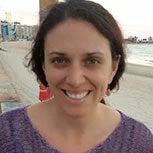 A female market-gardener, and beneficiary of the Food Systems Resilience Program (FSRP) in Togo. Credit: Ibrahim Yerima
A female market-gardener, and beneficiary of the Food Systems Resilience Program (FSRP) in Togo. Credit: Ibrahim Yerima
Earlier this month, we launched the Africa Regional Hub for Fertilizer and Soil Health, a groundbreaking initiative to enhance agricultural productivity and food security while addressing climate challenges. The Hub, financed to the tune of $10 million for the next five years by the World Bank through the Accelerating the Impact of CGIAR Climate Research for Africa (AICCRA) project, aims to implement and coordinate subregional programs for monitoring soil health and fertility in Africa.
Challenges for agricultural productivity, including climate change, pose serious threats to the livelihoods and well-being of millions of people across Africa. One main cause of this is the health and fertility of the continent's soils. Two-thirds of the land available for production is considered degraded, resulting in low crop and livestock yields, poverty, and the decline of natural resources. The average fertilizer application rate in Sub Saharan Africa is 22 kilograms per hectare, compared to a world average seven-times higher (146 kilograms per hectare), while skyrocketing and highly volatile fertilizer prices reduce their application even further. Moreover, the fertilizers applied are not always suitable to the needs of the soil and crops, or can be of low quality, and complementary inputs and advisory services are usually missing leading to low efficiency and sometimes even further soil degradation in the long run.

Figure 1: The vicious cycle of soil health decline, land degradation, poor crop yields, and ecosystem service loss underpinning the high incidence of malnutrition and poverty triggered by poor management of fertilizers and organic nutrient resources. Locally adapted integrated soil fertility and water management practices are critical for reversing this negative spiral and building soil health and resilience of crop production systems in SSA. Source: Zingore, 2022.
Building soil health and system resilience
One crucial solution is integrated soil fertility management, which involves the use of larger doses and better mixes of inorganic and organic fertilizers, as well as the implementation of sustainable agronomic practices.
By addressing the challenges of poor soil health and fertility, Africa can make significant progress in eliminating poverty and ensuring a sustainable future for generations to come. The newly launched Africa Regional Hub for Fertilizer and Soil Health, spearheaded by the Economic Community of West African States (ECOWAS) and supported by the World Bank and consortium of key institutions and industry stakeholders, is a concerted effort to improve soil health and agricultural practices. It will leverage the strengths of each partner to drive agronomic gains and support sustainable agricultural practices with a focus on information sharing, knowledge management, capacity development, agronomic recommendations, policy support, advocacy, and resource mobilization.
Other World Bank-supported initiatives such as the West and East Africa Food System Resilience Programs (FSRPs) are providing essential fertilizer inputs to hundreds of thousands of farmers in the region, designing and implementing pilots for repurposing fertilizer support programs, and conducting analytical work on public expenditure reviews.

Beneficiaries of the Food Systems Resilience Program (FSRP) in their rice farm in Togo. Credit: Ibrahim Yerima
But going forward, immediate actions are required around the following four axes to further address soil health in Africa:
- Improving public policies and support programs towards better targeting of scarce public expenditures. Fertilizer subsidies across African countries can be repurposed to support more balanced and precision use of fertilizers, crowd in private sector, and make support more targeted and geared towards integrated soil fertility management practices.
- Improving access to organic and mineral fertilizers. This can be achieved by improving internal trade and logistics barriers, addressing financing needs of manufactures, traders, and importers, improving access to input credit for farmers, and enhancing distribution networks for fertilizers to counter the limited availability of fertilizers in local markets.
- Improving efficient and more sustainable use of organic and mineral fertilizers. This can be done by providing farmers with better knowledge on soils, application of the “4Rs” (right source, right rate, right time, right place) and recommendations for fertilizer use with appropriate incentives that do not encourage their overuse. In addition, efforts should be made to maximize the use of soil mapping and remote sensing technologies to identify the status of soil health and the pathways to sustainable health improvements, and to improve farmers’ access to support and advisory services.
- Institutional and human capacity building, including through investing in research and development, and innovation systems to increase output per kilogram of fertilizer. This includes knowledge to ensure that best suited fertilizers and quantities are applied to specific crops; deploying precision agriculture technologies; use of fertigation; supplement mineral fertilizers with biofertilizers and nitrogen fixing crops; and continued identification and investment in innovation.
These efforts are crucial in working towards realizing the vision for a sustainable planet where soil health is prioritized, food security is ensured, climate change is addressed, and poverty is eradicated across Africa.



Join the Conversation